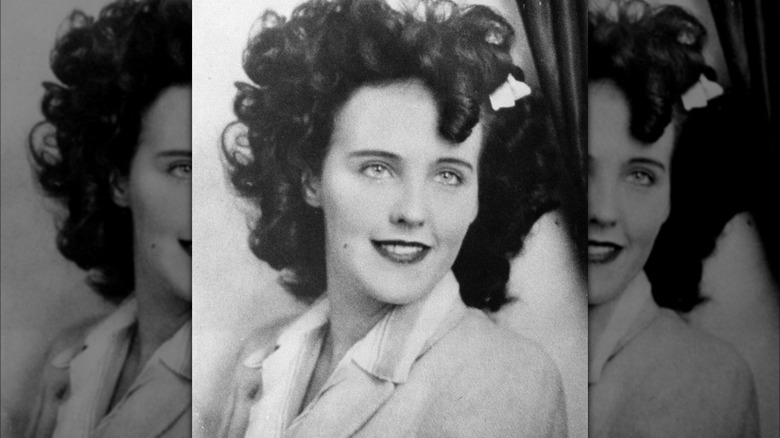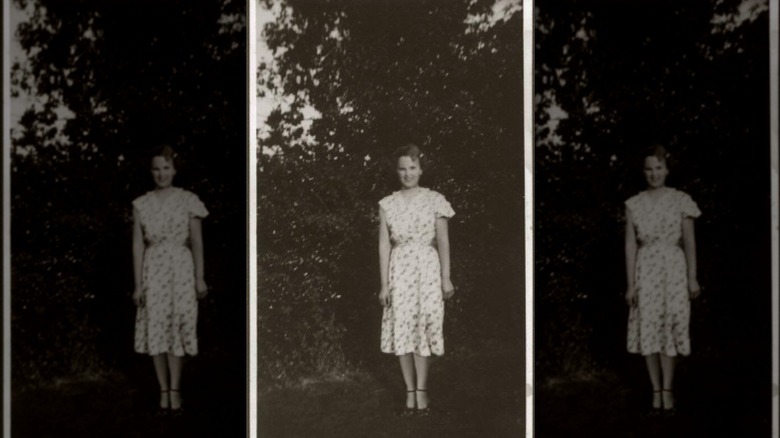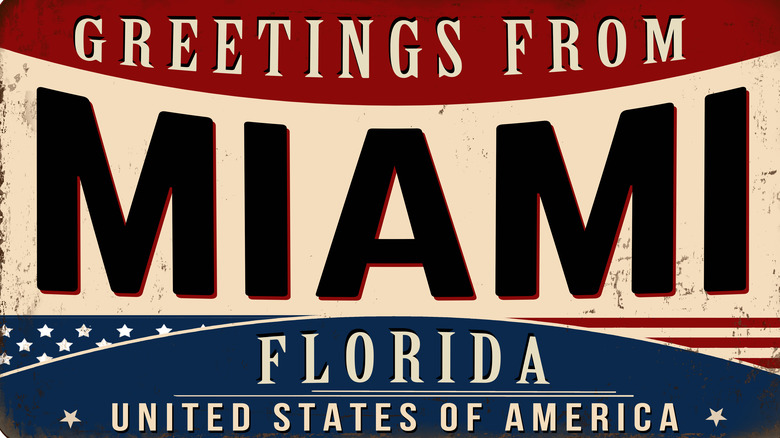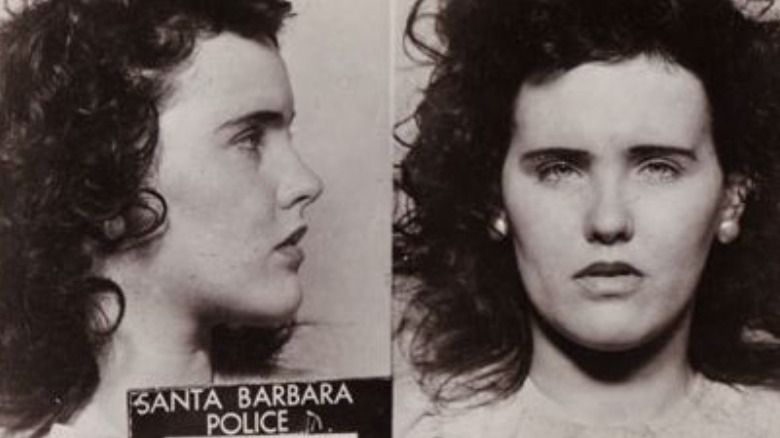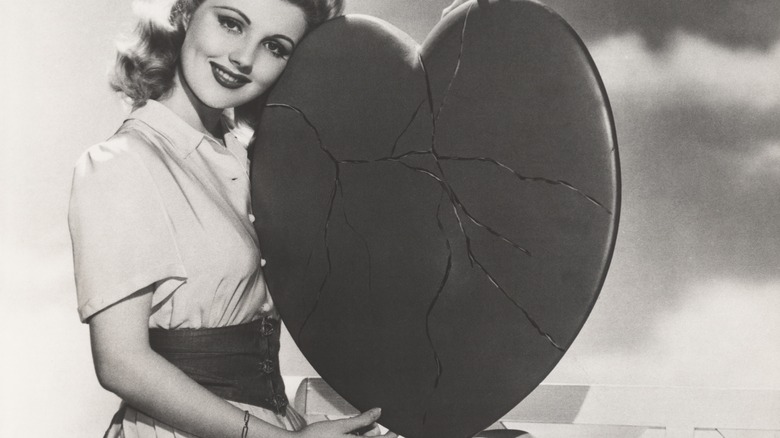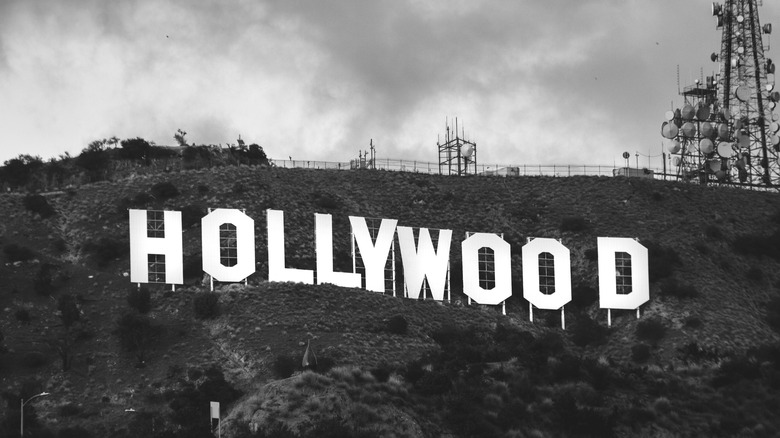The Black Dahlia's Brutal Murder Was The End Of A Life Riddled With Tragedy
The young mother who had been pushing her child in a stroller on Crenshaw Boulevard in Los Angeles stopped and stared at what she believed was part of a store mannequin lying in the weeds near the sidewalk (per "Severed"). But the more she stared on the morning of January 15, 1947, trying to make sense of what she was looking at, she realized it wasn't an abandoned store dummy at all. No, it was something so horrid it took her mind some time to piece it together — the body of a young woman that someone had sliced in half, stripped of clothing, and posed with her legs apart and her arms above her head. The killer had also slashed the victim's face, so she appeared to be grinning from ear to ear, among other gruesome wounds. The woman ran to the nearest home and called the police.
And with that began the most notorious unsolved murder in LA history. The name of the young woman, her naked body defaced and mutilated, was Elizabeth Short. Her family called her Betty, but in death, she would forever be known by the nickname she'd picked up since moving to California — the Black Dahlia — a play on the title of a noir film starring Alan Ladd and Veronica Lake, "The Blue Dahlia," that came out the year before. Short had raven black hair and a love of sheer black dresses. Just 22 years old, she'd had a hard life before meeting a brutal, unfathomable end.
A father who vanished
When Elizabeth Short was born on July 29, 1924, in Hyde Park, Massachusetts, a working-class Boston suburb, her family's prospects were on the upswing. Her father, Cleo, a skilled mechanic and World War I vet, and mother, Phoebe, smart and business-minded, had started a new venture building miniature golf courses, which were hugely popular at the time. They soon moved to a stately home in Medford, about 15 miles north but a world away in terms of upward mobility. Then the Great Depression hit in 1929, derailing the lives of the Shorts, as it did millions of others.
In 1930, after their construction business faltered, someone found Cleo's car abandoned near the Charlestown bridge. The police suspected suicide. In reality, Cleo had abandoned his wife and five daughters. Phoebe and her children struggled, moving back down the social ladder from one cheap dwelling place to another. Just days after Betty Short's gruesome murder, the press located Cleo Short — he'd been living in LA. Whether Betty knew this is uncertain. "If Betty knew her father was here, she never told me," Phoebe told the Los Angeles Times in January 1947.
Early health issues
Betty Short was a pretty child with wavy black hair and piercing sky-blue eyes. Her classmates thought she looked like a movie star. At age 10, she developed severe lung issues that eventually required surgery. Her doctors also suggested Short move to a more temperament climate, and so, at age 16, following her sophomore year in high school, she moved to Florida on her own and worked as a waitress. She returned each summer to Medford to see her family. Her mother told the Los Angeles Times that growing up, Short had been a "quiet, unassuming" girl.
In 1942, after her father got back in touch with her, he sent her money to travel west and stay with him in Vallejo, California. But there, the two clashed — he didn't approve of her dating service men — and he told her to move out the following January. This was the first of many times in the coming years when Short would temporarily find herself homeless.
Arrested
Betty Short got a job working at the PX at the U.S. Army base Camp Cooke (now Vandenberg Air Force Base), which came with room and board. But in September 1943, after the police came to a restaurant in Santa Barbara where she and a friend were drinking with some soldiers, they arrested her for being underage. A police officer, Mary Unkefer, took Short in until the case ended and then put her on a bus back to Massachusetts. "She was so pretty and had her heart set on staying in California — being in the movies," Unkefer recalled in "Severed: The True Story of the Black Dahlia." "I suggested she wait a couple of years, then give California another try."
Short didn't stay in Medford long. Soon she was back to living in Florida during the winters, where she began dating Lt. Matt Gordon Jr. — a U.S. Army Air Corps pilot just returned from China — and told her friends and family the two were engaged. His mother later denied any knowledge that her son and Short were planning on getting married.
Unlucky in love
Then, in the summer of 1945, Betty Short received a devastating message from Lt. Matt Gordon's mother. "Received word War Department Matt killed in crash," the telegram read (per the Los Angeles Times). "Our deepest sympathy is with you. Letters follows. Pray it isn't true." It was true. Gordon had died in a plane crash on his way back from India.
By the following summer, Short was dating another airman, Joseph Fickling, who she met in Los Angeles, where she'd gone with her heart, still set on making it in Hollywood. Their relationship soon fizzled out. In one of her letters to him after he began getting cold feet about marriage, she wrote (via the St. Louis Globe-Democrat): "Frankly, darling, if everyone waited to have everything all smooth before they decided to marry, none of them would be together." There were other short-lived romances, but as the time moved ever closer to her terrible end, her search for real love came up empty.
A dream of stardom
In the last months of Betty Short's life, she was once again back in Hollywood and still holding fast to her dream of stardom. She lived with a series of other young women with the same dream in various apartments, including one in which she bunked with seven other women. She told her mother she'd become an actress, working as an extra in Hollywood productions. That was a lie — Short had tried but without success. She often resorted to borrowing money from friends and relatives to get by.
The aspiring actress may not have found stardom in her short, tragic life, but she certainly found it in death. Her gruesome torture, killing, and the aftermath — including the smearing of her name by the tabloid press who alluded that she had been a call girl when there was no evidence of this — helped guarantee the Black Dahlia would live on. The most enduring element is likely that her murder remains officially unsolved. But in 2003, a retired LAPD detective, Steve Hodel, wrote a book detailing how he'd stumbled onto substantial evidence that his own father, George Hodel Jr., a wealthy doctor who died in 1999, was the killer.
